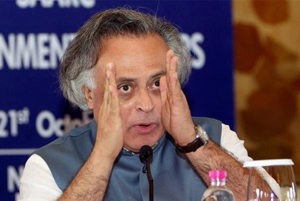 Ranchi, Dec 26: Congress leader Jairam Ramesh on Wednesday said the party is not blindly supporting the Aam Aadmi Party (AAP) in the formation of next government in Delhi, and called for a programme or a committee to look into the coordination between the two parties.
Ranchi, Dec 26: Congress leader Jairam Ramesh on Wednesday said the party is not blindly supporting the Aam Aadmi Party (AAP) in the formation of next government in Delhi, and called for a programme or a committee to look into the coordination between the two parties.
“It is unfortunate but true that the voters in Delhi against the Congress. We did not get the mandate as it was against us. Extending support to the AAP is different issue and it is not decided by me. It is decided by the party high command. A final decision is taken after considering all the issues. All this is done by party high command,” said Jairam.
“But when we extend support to some other party, then there should be some programme or committee to look after the coordination between the parties. It is not that we will close our eyes and will give support blindly to the other party,” he added.
“There are different opinions in the party and this is what Janardhan Dwivedi has conveyed.
Few leaders want us to continue support and few are against this decision. So, a final decision will be taken soon,” he said.
Congress leader Janardhan Dwivedi on Tuesday admitted that a group within the Congress thinks we shouldn't have extended support to the AAP.
"There were divergent views within the Congress on extending support to the Aam Aadmi Party. There is an opinion in the Congress that the decision to support AAP was not correct," Dwivedi said.
"It is true that there are certain opinions in the party that we should not have extended support to the Aam Aadmi Party (AAP) in Delhi. The reason behind this is that the voters of Delhi did not support Congress to such an extent that we did not even come up as the main opposition," he added.
The Congress general secretary further said: "Since now a proposal (to support AAP) has already been made, we have to carry on with that as well. Perhaps we will have to find out a middle path.
Several Congress workers had earlier protested in front of the Delhi Pradesh Congress Committee (DPCC) headquarters against the decision of the party to support the AAP.
The workers also burnt effigies of Kejriwal, protesting against the abusive language used by several AAP leaders.
In a letter written to the Lt. Governor Najeeb Jung, the Congress, which has 8 MLAs, decided to extend unconditional support to the AAP, which have 28 MLAs, to form the next government in Delhi.
On Monday, Kejriwal met Lt. Governor Jung and staked a claim to form the next government in Delhi with Congress support.
The AAP had bagged 28 seats in the 70-member Delhi assembly. The BJP had emerged as the single largest party by winning 31 seats while the Congress had stood a poor third with eight seats.





Comments
Add new comment